-

新人教版高中英语必修3Unit 3 Diverse Cultures-Reading for Writing教学设计
The topic of this part is “Describe a place with distinctive cultural identity”.This section focuses on Chinese culture by introducing Chinatown, whose purpose is to show the relationship between the Chinese culture and American culture. The Chinese culture in Chinatown is an important part of American culture. Chinatown is an important window of spreading Chinese culture and the spirit homeland of oversea Chinese, where foreigners can experience Chinese culture by themselves.Concretely, the title is “Welcome to Chinatown!”, from which we can know that the article aims at introducing Chinatown. The author used the “Introduction--Body Paragraph--Conclusion” to describe the people, language, architecture, business, famous food and drinks and people’s activities, which can be a centre for Chinese culture and shows its unique charm.1. Read quickly to get main idea; read carefully to get the detailed information.2. Learn the characteristics of writing and language.3. Learn to introduce your own town according to the text.4. Learn to correct others’ writing.1. Learn the characteristics of writing and language.2. Learn to introduce your own town according to the text.Step 1 Lead in ---Small talkIn the reading part, we mentioned the Chinatown of San Francisco. How much do you know about Chinatown of San Francisco ?Chinatown is a main living place for Chinese immigrants, where you can see many Chinese-style buildings, costumes, operas, restaurants, music and even hear Chinese.Step 2 Before reading ---Predict the contentWhat is the writer’s purpose of writing this text ? How do you know ?From the title(Welcome to Chinatown) and some key words from the text(tourist, visit, visitors, experience), we can know the purpose of the text is to introduce Chinatown and show the relationship between Chinese culture and American culture.

新人教版高中英语必修3Unit 3 Diverse Cultures-Reading and Thinking教学设计
Discuss these questions in groups.Q1: Have you ever been to a place that has a diverse culture ? What do you think about the culture diversity ?One culturally diverse place that I have been to is Harbin, the capital city of Heilongjiang Province. I went there last year with my family to see the Ice and Snow Festival, and I was amazed at how the culture as different to most other Chinese cities. There is a big Russian influence there, with beautiful Russian architecture and lots of interesting restaurants. I learnt that Harbin is called “the Oriental Moscow” and that many Russians settled there to help build the railway over 100 years ago.Q2: What are the benefits and challenges of cultural diversity ?The benefits: People are able to experience a wide variety of cultures, making their lives more interesting, and it can deepen the feelings for our national culture, it is also helpful for us to learn about other outstanding culture, which helps improve the ability to respect others. The challenges: People may have trouble communicating or understanding each other, and it may lead to disappearance of some civilizations and even make some people think “The western moon is rounder than his own.”Step 7 Post reading---RetellComplete the passage according to the text.Today, I arrived back in San Francisco, and it feels good (1) _____(be) back in the city again. The city succeeded in (2)_________ (rebuild) itself after the earthquake that (3)________ (occur) in 1906, and I stayed in the Mission District, enjoying some delicious noodles mixed with cultures. In the afternoon, I headed to a local museum (4)____ showed the historical changes in California. During the gold rush, many Chinese arrived, and some opened up shops and restaurants in Chinatown to earn a (5)_____ (live). Many others worked on (6)______ (farm), joined the gold rush, or went to build the railway that connected California to the east. The museum showed us (7)____ America was built by immigrants from (8)________ (difference) countries and cultures. In the evening, I went to Chinatown, and ate in a Cantonese restaurant that served food on (9)________(beauty) china plates. Tomorrow evening, I’m going to (10)__ jazz bar in the Richmond District. 答案:1. to be 2. rebuilding 3. occurred 4. that 5.living6. farms 7.how 8. different 9. beautiful 10. a

新人教版高中英语必修3Unit 4 Space Exploration-Discovering Useful Structure教学设计
The theme of the section is “Describe space facts and efforts to explore space”. Infinitives are one of non-finite verbs, as the subjects, objects, predicative, attributes and adverbials. This unit is about space exploration, which is a significant scientific activity, so every scientific activity has strong planning. Therefore, using the infinitives to show its purpose, explanations or restrictions is the best choice.1. Learn the structure, functions and features of infinitives.2. Learn to summarize some rules about infinitives to show purpose and modify.3. Learn to use infinitives in oral and writing English. 1. Learn the structure, functions and features of infinitives.2. Learn to summarize some rules about infinitives to show purpose and modify.3. Learn to use use infinitives in oral and writing English.Step 1 Lead in---Pair workLook at the following sentences and focus on the italicized infinitives. In pairs, discuss their functions. 1. I trained for a long time to fly airplanes as a fighter pilot..(作目的状语)2. As we all know, an astronaut needs to be healthy and calm in order to work in space..(作目的状语)3. First of all, you must be intelligent enough to get a related college degree..(作目的状语)4. Some scientist were determined to help humans realise their dream to explore space..(作定语)5. On 12 April 1961, Yuri Gagarin became the first person in the world to go into space..(作定语)Summary:1. 不定式的结构:to+do原形。2. 分析上面的句子,我们知道在描述太空探索时,动词不定式不仅可以用来表目的,还可以用来作定语,表修饰。

新人教版高中英语必修3Unit 4 Space Exploration-Reading and Thinking教学设计一
Q4: What is the function of the International exploration ?Having astronauts from different countries on boardQ5: What can you learn from Para 4 ?China has made great achievements in exploring spaceQ6: What is the attitude to the space exploration ?SupportiveStep 6 Post reading---RetellPeople have always wanted to learn more about space. Before the mid-20th century, most people felt (1)_________ (travel) into space was an impossible dream. However, (2)____ the help of scientists, peoplesucceeded in realizing their dream (3) _________ (explore) space. On 4 October 1957, the Sputnik 1 satellite (4) ____________(launch) by the USSR. (5) ________________ scientists try to make sure nothing goes wrong, accidents can still happen. These disasters made everyone(6)___________(disappoint), but people still believe in the importance of (7) ________(carry) on space exploration. In 2003, China became the third country to (8)_____________ (independent) send humans into space. Then Shenzhou 6 and 7 completed (9)____ second manned orbit and the first Chinese spacewalk. In spite of the difficulties, scientists hope future (10)__________ (discovery) will not only enable us to understand the universe but also help us survive well into the future.Answers: 1. travelling 2. with 3. to explore 4. was launched 5. Although6. disappointed 7. carrying 8. independently 9. a 10. discoveriesStep 6 Post reading---Critical thinkingQ1: What do you think of the space exploration ? I think it is beneficial to us. Through further study of space, people will make full use of it in the future, such as the space experiments by Wang Yaping in Tian Gong 1.Q2: If you are determined to be an astronaut, what should you prepare at present ?First of all, I should study hard to get a related college degree. Besides, I must keep mental and physical healthy.Step 7. HomeworkTry to summarize the structure of the article by a mind map.

新人教版高中英语必修3Unit 5 The Value of Money- Discovering Useful Structure教学设计
Step 3 Meaning1. 过去将来时表示从过去某一时间来看将要发生的动作或存在的状态, 常用在宾语从句中。一般由“would/should +动词原形”构成。She hoped that they would meet again someday. 她希望将来有一天他们能再见面。2. was/were going to+动词原形: 表示过去将要发生或很有可能发生的动作, 常用于口语中, 表示预言、意图或者打算等。He was going to start work the following week. 他打算下星期开始工作。3. was/were about to do: 常用来表示即将发生的动作, “刚要/正要做……”。注意该结构不与任何时间状语连用。I felt that something terrible was about to happen. 我感到某种可怕的事情即将发生。4.was/were to do: 表示“曾计划做某事”, 如果表示“本来计划做某事, 动作没实现”, 则需用 “was/were to have done”。She said she was to have told me about the accident. 她说她本来想告诉我关于事故的事。5.Start, go, come, leave, see, meet等动词的过去进行时: 表示就过去某一时刻而言即将发生的动作。She was coming later. 她随后就来。I had just put on my overcoat and was leaving to visit a friend of mine. 我刚穿上外套要去看我的一个朋友。

新人教版高中英语必修3Unit 5 The value of money-Reading and Thinking教学设计二
? Could you offer me some kind of work here?? I don’t want your charity, I just want an honest job.? Careless: I landed in Britain by accident.Step 7:Consolidation.? Find Henry? Roderick and Oliver were I .making a bet when they saw Henry, a poor young man. ? Know Henry? About a month ago, Henry was sailing and later he found himself carried out to sea by a strong wind. Fortunately, he 2.was spotted by a ship. And it was the ship that brought him to 3.England? Offer money to Henry ? Oliver and Roderick gave Henry a letter and told him that there was money in it. They 4.persuaded him to accept it, and made him 5.promise that it wouldn't be opened until 2 o'clock.Step 8:Language pointsa large amount of: a large quantity of; a great deal ofe.g. They bought a large amount of furniture before they moved their new house.make a bet: make an arrangement to risk money, etc. on an event of which the result is doubtful.e.g. We made a bet on the result of the match.permit sb to do something: allow somebody to do somethinge.g. My mother doesn’t permit me to ride in the street after it rained.by accident: as a result of chancee.g. I only found it by accident.stare at: look at somebody or something with the eyes wide open in a fixed gaze( in astonishment, wonder, fear, etc)to be honest: to tell you the truth; to be franke.g. To be honest, I don’t think we have a chance of winning.Step7 Homework:What do you think will happen to Henry? Will the bank-note help him or get him into trouble?

新人教版高中英语必修3Unit 5 the value of money-Reading For Writing教学设计一
【参考范文】Narrator:(Henry is smiling as he leaves the restaurant. As he is walking down the street, he sees a sign for a place that cuts hair. He decides to get it cut. )H=Henry;B=Barber;R=rude manH:Good afternoon, I'd like to get a cut, if I may. (The barber looks at Henry's hair and continues cutting another man's hair. )Er, I'd really like a haircut. As you can see it's much too long. B:(in a rude manner) Yes, I can see that. Indeed, I can. H:Fine, well I'll have a seat then. (He sits in one of the barber's chairs. The barber turns to look at Henry. )B:It's quite expensive here, you know!Are you sure you can afford it?H:Yes. I think so. (In comes the rude man. )R:Hey you there. I need a haircut quickly. Can you do me straightaway?B:All right, then, get in the chair and I'll see what I can do. R:Thank you. (sits down in one of the barber's chairs)H:Excuse me, but I was here first. Aren't you going to do my hair first?B:This man's in a hurry. H:Well so am I!I insist that you cut my hair first. B:OK, but I'll have to be quick. This gentleman is waiting. H:Thank you. (They both become quiet. After his hair is cut, the barber tells Henry how much he must pay. Henry shows the barber the bank note. )B:Why, Mr . . . (looks shocked)H:Adams. Henry Adams. I'm sorry, I don't have any change. R:You're that Mr Adams! Well,I'm glad I waited or I might never have known it was you. B:Why, Mr Adams, please don't worry!(wearing a big smile) Nothing to worry about!Nothing at all!Please come back any time, even if you only need too little hairs cut!It will be my honour to serve you!

新人教版高中英语选修2Unit 4 Journey Across a Vast Land教学设计
当孩子们由父母陪同时,他们才被允许进入这个运动场。3.过去分词(短语)作状语时的几种特殊情况(1)过去分词(短语)在句中作时间、条件、原因、让步状语时,相当于对应的时间、条件、原因及让步状语从句。Seen from the top of the mountain (=When it is seen from the top of the mountain), the whole town looks more beautiful.从山顶上看,整个城市看起来更美了。Given ten more minutes (=If we are given ten more minutes), we will finish the work perfectly.如果多给十分钟,我们会完美地完成这项工作。Greatly touched by his words (=Because she was greatly touched by his words), she was full of tears.由于被他的话深深地感动,她满眼泪花。Warned of the storm (=Though they were warned of the storm), the farmers were still working on the farm.尽管被警告了风暴的到来,但农民们仍在农场干活。(2)过去分词(短语)在句中作伴随、方式等状语时,可改为句子的并列谓语或改为并列分句。The teacher came into the room, followed by two students (=and was followed by two students).后面跟着两个学生,老师走进了房间。He spent the whole afternoon, accompanied by his mom(=and was accompanied by his mom).他由母亲陪着度过了一整个下午。

新人教版高中英语选修2Unit 2 Bridging Cultures-Discovering useful structures教学设计
The grammar of this unit is designed to review noun clauses. Sentences that use nouns in a sentence are called noun clauses. Nominal clauses can act as subject, object, predicate, appositive and other components in compound sentences. According to the above-mentioned different grammatical functions, nominal clauses are divided into subject clause, object clause, predicate clause and appositive clause. In this unit, we will review the three kinds of nominal clauses. Appositive clauses are not required to be mastered in the optional compulsory stage, so they are not involved.1. Guide the students to judge the compound sentences and determine the composition of the clauses in the sentence.2. Instruct students to try to learn grammar by generalizing grammar rules, controlling written practice, and semi-open oral output.3. Inspire the students to systematize the function and usage of noun clause1.Instruct students to try to learn grammar by generalizing grammar rules, controlling written practice, and semi-open oral output.2.Inspire the students to systematize the function and usage of noun clauseStep1: The teacher ask studetns to find out more nominal clauses from the reading passage and udnerline the nominal clauses.
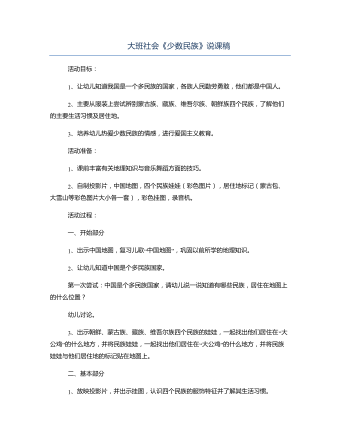
大班社会《少数民族》说课稿
基本部分是让幼儿认识各民族的服饰特征与生活习惯,通过认识、巩固加深幼儿印象。可以先让幼儿观察幻灯片,由教师的导语让幼儿尝试,进一步仔细观察挂图,在幼儿回答的基础上由教师小结,由此培养幼儿的观察能力与表达能力。然后是复习巩固,通过自制幻灯片的添色游戏,调动幼儿兴趣,快速辨认并参与游戏,这样幼儿既动手参与了游戏、活跃了课堂气氛,又复习了新课。最后为了丰富知识,让幼儿大致了解他们的音乐及舞蹈,这样满足孩子爱唱爱跳的欲望,培养音乐的感受力及欣赏、创编的能力,老师应跳出各民族的舞蹈风格,用情绪与动作感染幼儿,活跃课堂气氛。结束部分既要与开头呼应,又是全课的“点睛之笔”,再一次理解“民族大团结”的含义,通过浅显的讲解与欢快的动作,让幼儿感受“团结、欢乐”的氛围,由此完成教学目的。
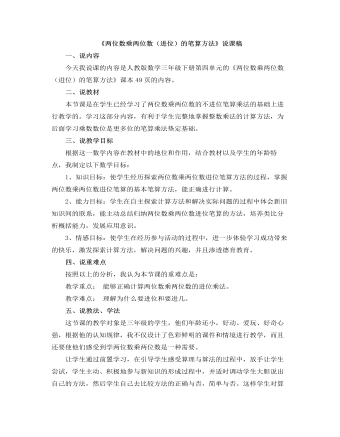
小学数学人教版三年级下册《两位数乘两位数(进位)的笔算方法》说课稿
一、说内容今天我说课的内容是人教版数学三年级下册第四单元的《两位数乘两位数(进位)的笔算方法》课本49页的内容。二、说教材本节课是在学生已经学习了两位数乘两位数的不进位笔算乘法的基础上进行教学的。学习这部分内容,有利于学生完整地掌握整数乘法的计算方法,为后面学习乘数数位是更多位的笔算乘法垫定基础。三、说教学目标根据这一数学内容在教材中的地位和作用,结合教材以及学生的年龄特点,我制定以下数学目标:1、知识目标:使学生经历探索两位数乘两位数进位笔算方法的过程,掌握两位数乘两位数进位笔算的基本笔算方法,能正确进行计算。2、能力目标:学生在自主探索计算方法和解决实际问题的过程中体会新旧知识间的联系,能主动总结归纳两位数乘两位数进位笔算的方法,培养类比分析概括能力,发展应用意识。
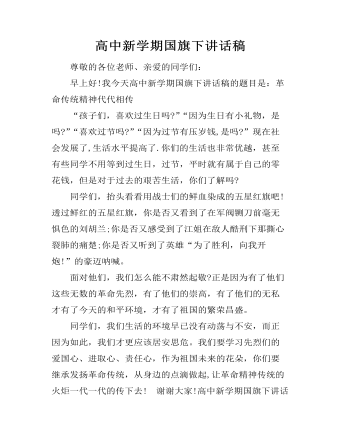
高中新学期国旗下讲话稿
尊敬的各位老师、亲爱的同学们:早上好!我今天高中新学期国旗下讲话稿的题目是:革命传统精神代代相传“孩子们,喜欢过生日吗?”“因为生日有小礼物,是吗?”“喜欢过节吗?”“因为过节有压岁钱,是吗?”现在社会发展了,生活水平提高了.你们的生活也非常优越,甚至有些同学不用等到过生日,过节,平时就有属于自己的零花钱,但是对于过去的艰苦生活,你们了解吗?同学们,抬头看看用战士们的鲜血染成的五星红旗吧!透过鲜红的五星红旗,你是否又看到了在军阀铡刀前毫无惧色的刘胡兰;你是否又感受到了江姐在敌人酷刑下那撕心裂肺的痛楚;你是否又听到了英雄“为了胜利,向我开炮!”的豪迈呐喊。
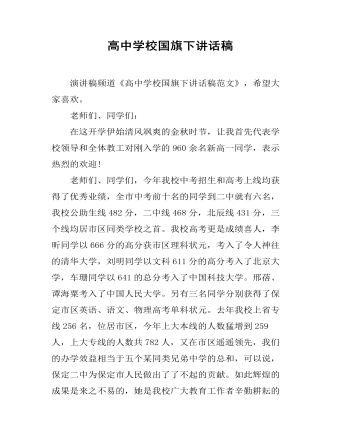
高中学校国旗下讲话稿
演讲稿频道《高中学校国旗下讲话稿范文》,希望大家喜欢。老师们、同学们:在这开学伊始清风飒爽的金秋时节,让我首先代表学校领导和全体教工对刚入学的960余名新高一同学,表示热烈的欢迎!老师们、同学们,今年我校中考招生和高考上线均获得了优秀业绩,全市中考前十名的同学到二中就有六名,我校公助生线482分,二中线468分,北辰线431分,三个线均居市区同类学校之首。我校高考更是成绩喜人,李昕同学以666分的高分获市区理科状元,考入了令人神往的清华大学,刘明同学以文科611分的高分考入了北京大学,车珊同学以641的总分考入了中国科技大学。邢蓓、谭海粟考入了中国人民大学。另有三名同学分别获得了保定市区英语、语文、物理高考单科状元。去年我校上省专线256名,位居市区,今年上大本线的人数猛增到259人,上大专线的人数共782人,又在市区遥遥领先,我们的办学效益相当于五个某同类兄弟中学的总和,可以说,保定二中为保定市人民做出了了不起的贡献。如此辉煌的成果是来之不易的,她是我校广大教育工作者辛勤耕耘的结果。
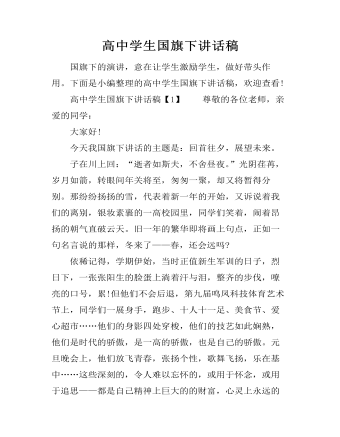
高中学生国旗下讲话稿
国旗下的演讲,意在让学生激励学生,做好带头作用。下面是小编整理的高中学生国旗下讲话稿,欢迎查看!高中学生国旗下讲话稿【1】 尊敬的各位老师,亲爱的同学:大家好!今天我国旗下讲话的主题是:回首往夕,展望未来。子在川上回:“逝者如斯夫,不舍昼夜。”光阴荏苒,岁月如箭,转眼间年关将至,匆匆一聚,却又将暂得分别。那纷纷扬扬的雪,代表着新一年的开始,又诉说着我们的离别,银妆素裹的一高校园里,同学们笑着,闹着昂扬的朝气直破云天。旧一年的繁华即将画上句点,正如一句名言说的那样,冬来了——春,还会远吗?依稀记得,学期伊始,当时正值新生军训的日子,烈日下,一张张阳生的脸蛋上淌着汗与泪,整齐的步伐,嘹亮的口号,累!但他们不会后退,第九届鸣凤科技体育艺术节上,同学们一展身手,跑步、十人十一足、美食节、爱心超市……他们的身影四处穿梭,他们的技艺如此娴熟,他们是时代的骄傲,是一高的骄傲,也是自己的骄傲。元旦晚会上,他们放飞青春,张扬个性,歌舞飞扬,乐在基中……这些深刻的,令人难以忘怀的,或用于怀念,或用于追思——都是自己精神上巨大的的财富,心灵上永远的慰藉。
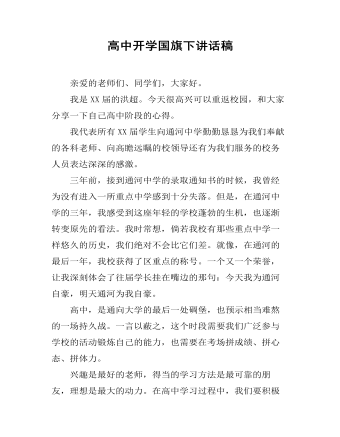
高中开学国旗下讲话稿
亲爱的老师们、同学们,大家好。我是XX届的洪超。今天很高兴可以重返校园,和大家分享一下自己高中阶段的心得。我代表所有XX届学生向通河中学勤勤恳恳为我们奉献的各科老师、向高瞻远瞩的校领导还有为我们服务的校务人员表达深深的感激。三年前,接到通河中学的录取通知书的时候,我曾经为没有进入一所重点中学感到十分失落。但是,在通河中学的三年,我感受到这座年轻的学校蓬勃的生机,也逐渐转变原先的看法。我时常想,倘若我校有那些重点中学一样悠久的历史,我们绝对不会比它们差。就像,在通河的最后一年,我校获得了区重点的称号。一个又一个荣誉,让我深刻体会了往届学长挂在嘴边的那句:今天我为通河自豪,明天通河为我自豪。高中,是通向大学的最后一处碉堡,也预示相当难熬的一场持久战。一言以蔽之,这个时段需要我们广泛参与学校的活动锻炼自己的能力,也需要在考场拼成绩、拼心态、拼体力。
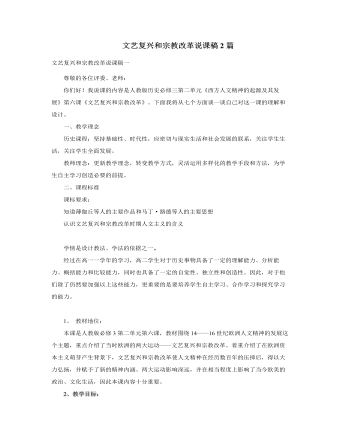
人教版高中历史必修3文艺复兴和宗教改革说课稿2篇
师:在科学发展过程中,前一个理论体系的不完善之处,往往是新的研究和新的发现的突破口。开普勒之后,意大利天文学家伽利略创制了天文望远镜,用更加精确的观察继续发展和验证哥白尼创立的新天文学理论。除了用望远镜进行天文观察以外,伽利略还开始进行自然科学的实验研究,哪位同学能给大家讲一讲伽利略在比萨斜塔上所作的关于物体自由下落的实验?生:(讲述这一实验)师:所以,伽利略在科学方面更加重要的贡献是奠定了近代实验科学的基础。(2)实验科学和唯物主义师:伽利略从实践上开辟了实验科学的方法,而英国唯物主义哲学家培根则从理论上阐述了实验科学的方法——归纳法。培根和伽利略同被称为实验科学之父,培根还有一句影响深刻的名言:“知识就是力量”,表明了他注重知识,尊崇科学的精神。我们再来概括一下意大利哲学家布鲁诺的唯物主义思想,是否有同学可以简述布鲁诺的生平事迹?
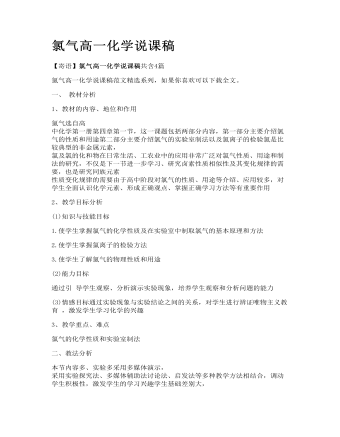
氯气高一化学说课稿
1、教材的内容、地位和作用氯气选自高 中化学第一册第四章第一节,这一课题包括两部分内容,第一部分主要介绍氯气的性质和用途第二部分主要介绍氯气的实验室制法以及氯离子的检验氯是比较典型的非金属元素,氯及氯的化和物在日常生活、工农业中的应用非常广泛对氯气性质、用途和制法的研究,不仅是下一节进一步学习、研究卤素性质相似性及其变化规律的需要,也是研究同族元素 性质变化规律的需要由于高中阶段对氯气的性质、用途等介绍、应用较多,对学生全面认识化学元素、形成正确观点、掌握正确学习方法等有重要作用
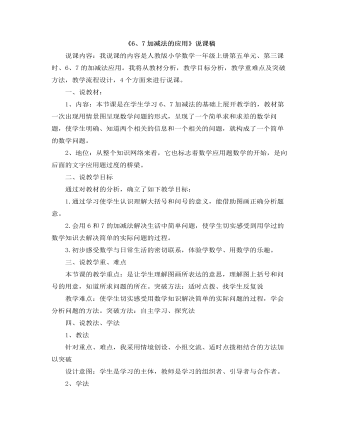
小学数学人教版一年级上册《6、7加减法的应用》说课稿
说课内容:我说课的内容是人教版小学数学一年级上册第五单元、第三课时、6、7的加减法应用。我将从教材分析,教学目标分析,教学重难点及突破方法,教学流程设计,4个方面来进行说课。一、说教材:1、内容:本节课是在学生学习6、7加减法的基础上展开教学的,教材第一次出现用情景图呈现数学问题的形式,呈现了一个简单求和求差的数学问题,使学生明确、知道两个相关的信息和一个相关的问题,就构成了一个简单的数学问题。2、地位:从整个知识网络来看,它也标志着数学应用题数学的开始,是向后面的文字应用题过度的桥梁。二、说教学目标通过对教材的分析,确立了如下教学目标:1.通过学习使学生认识理解大括号和问号的意义,能借助图画正确分析题意。2.会用6和7的加减法解决生活中简单问题,使学生切实感受到用学过的数学知识去解决简单的实际问题的过程。3.初步感受数学与日常生活的密切联系,体验学数学、用数学的乐趣。
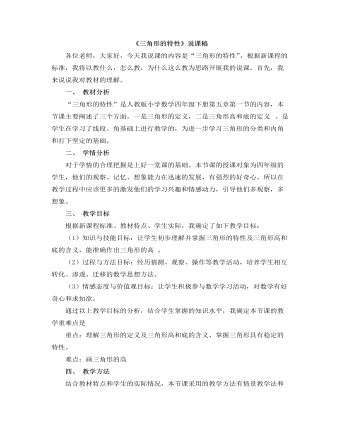
小学数学人教版四年级下册 《三角形的特性》说课稿
一、 教材分析“三角形的特性”是人教版小学数学四年级下册第五章第一节的内容,本节课主要阐述了三个方面,一是三角形的定义,二是三角形高和底的定义 。是学生在学习了线段、角基础上进行教学的,为进一步学习三角形的分类和内角和打下坚定的基础。二、 学情分析对于学情的合理把握是上好一堂课的基础。本节课的授课对象为四年级的学生,他们的观察、记忆、想象能力在迅速的发展,有强烈的好奇心。所以在教学过程中应该更多的激发他们的学习兴趣和情感动力,引导他们多观察,多想象。 三、 教学目标根据新课程标准、教材特点、学生实际,我确定了如下教学目标:(1)知识与技能目标:让学生初步理解并掌握三角形的特性及三角形高和底的含义,能准确作出三角形的高 。(2)过程与方法目标:经历猜测、观察、操作等教学活动,培养学生相互转化、渗透、迁移的数学思想方法。(3)情感态度与价值观目标:让学生积极参与数学学习活动,对数学有好奇心和求知欲。
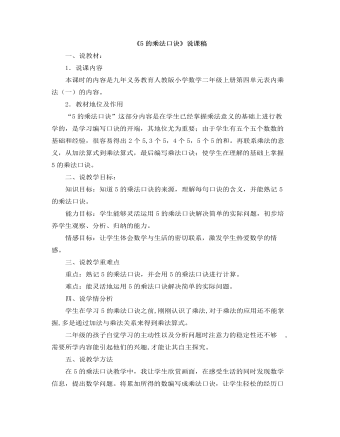
小学数学人教版二年级上册《5的乘法口诀》说课稿
1.说课内容本课时的内容是九年义务教育人教版小学数学二年级上册第四单元表内乘法(一)的内容。2.教材地位及作用“5的乘法口诀”这部分内容是在学生已经掌握乘法意义的基础上进行教学的,是学习编写口诀的开端,其地位尤为重要;由于学生有五个五个数数的基础和经验,很容易得出2个5,3个5,4个5,5个5的和。再联系乘法的意义,从加法算式到乘法算式,最后编写乘法口诀;使学生在理解的基础上掌握5的乘法口诀。二、说教学目标:知识目标:知道5的乘法口诀的来源,理解每句口诀的含义,并能熟记5的乘法口诀。能力目标:学生能够灵活运用5的乘法口诀解决简单的实际问题,初步培养学生观察、分析、归纳的能力。情感目标:让学生体会数学与生活的密切联系,激发学生热爱数学的情感。

